Cereals
Breakfast cereals are often fortified with fiber, vitamins, and minerals and provide a convenient way to boost daily nutrition and energy.
Upto 9% OFF

Pintola High Protein Muesli Dark Chocolate & Cranberry
From
₹295
MRP: ₹325
Add
7% OFF

Ritebite Max Protein Granola Nuts & Seeds (no Added Sugar)
₹371
MRP: ₹399
Add18% OFF
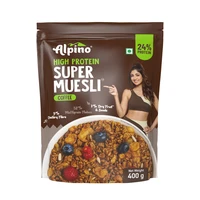
Alpino High Protein Super Muesli Coffee
₹343
MRP: ₹419
Add13% OFF
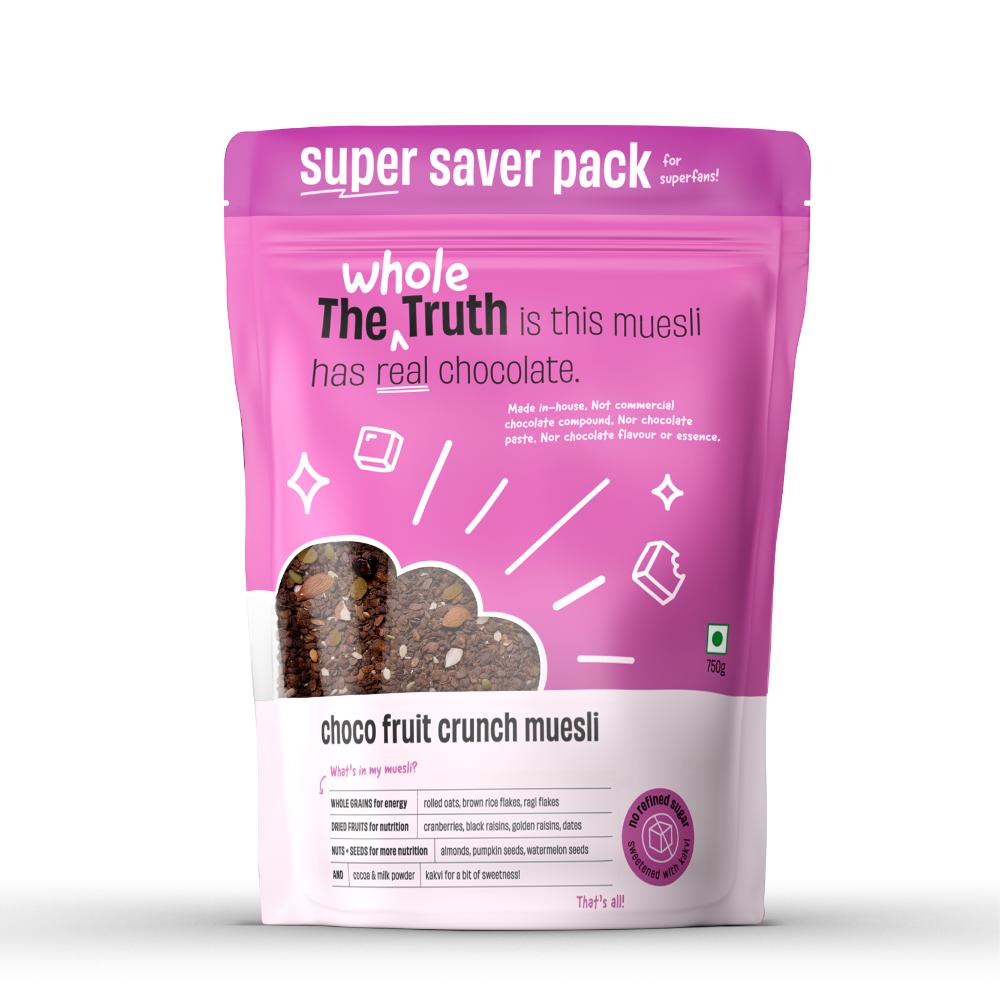
The Whole Truth Choco Fruit Crunch Breakfast Muesli
₹347
MRP: ₹399
Add7% OFF
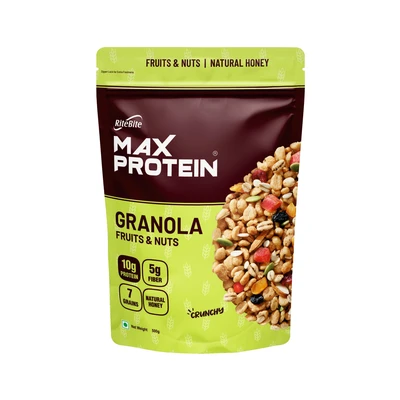
Ritebite Max Protein Granola Fruits & Nuts
₹371
MRP: ₹399
Add7% OFF

Ritebite Max Protein Granola Choco Crunchy
₹371
MRP: ₹399
AddUpto 37% OFF
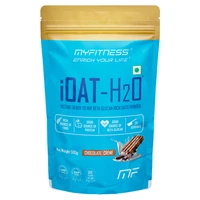
Myfitness Ioat - H2o
From
₹377
MRP: ₹600
Add
29% OFF
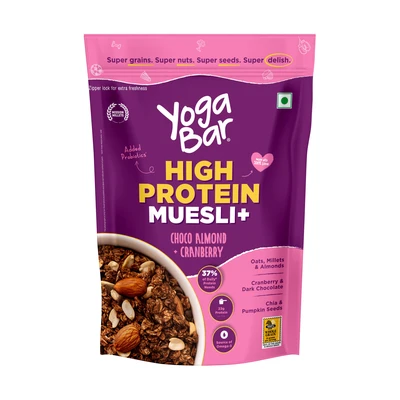
Yogabar 21g Protein Muesli+ Choco Almond + Cranberry
₹582
MRP: ₹825
Add
Get Your Cereals Online from Nutrabay
Cereals are the grains from which the inedible part is removed. They are carbohydrate-rich and contain other nutrients like proteins, vitamins, dietary fibre, and minerals. Rice, oats, corn, and wheat are a few cereals examples.
Cereals have increasingly become a regular part of our diet in the form of breakfast cereals. They are often fortified with other nutrients, quick to prepare and versatile to consume.
Cereals: Benefits & Uses
Here are a few health benefits of adding cereal grains to your diet.
- Energy-dense: Cereals are a significant energy source due to their high carbohydrate content. They can help us maintain energy levels for longer and stay energized throughout the day.
- Rich in dietary fibre: Whole-grain cereals are high in dietary fibre. They keep us satiated for a long and promote a healthy gut. In addition, fibre is also considered good for the heart and healthy cholesterol levels.
- Support a healthy weight: People aiming to lose weight and improve their body composition can consider including whole-grain cereals in their diet. They are high in protein and dietary fibre, which may help reduce food cravings and provide fullness.
- Healthy blood glucose levels:Carbohydrate-rich food may cause blood sugar levels to spike, but cereal with high dietary fibre content does not cause sudden insulin spikes. Instead, they may help maintain stable sugar levels in the blood.
- Micronutrient-rich: Cereals are a good source of nutrients like B vitamins, calcium, zinc, and magnesium. Some breakfast cereals are fortified with additional nutrients like vitamin D, iron, calcium, etc.
- Easy to consume: Breakfast cereals come with ease of consumption. They can be enjoyed with milk, yogurt, nuts, and fruits.
Types of cereal
There are several types of cereals which are commonly consumed.
- Whole wheat: Whole wheat is rich in dietary fibre and low in fat. It contains a good amount of plant-based protein and other nutrients like magnesium, zinc, and iron. Whole wheat may help reduce heart disease risk because of its high fibre content.
- Rice: Rice is rich in complex carbs, naturally gluten-free and easy to digest. It is low in sodium but a good source of niacin, thiamine, and vitamin B6.
- Oat: Oats are one of the healthiest grains and are high in soluble fibre-beta glucan. They are protein-rich and naturally gluten-free. Oats have been shown to help maintain healthy cholesterol levels and reduce diabetes risk.
- Corn: Corns are a good source of vitamin A, dietary fibre, niacin, thiamine, and potassium. They are high in antioxidants like lutein and zeaxanthin, which may help lower the risk of age-related macular degeneration.
- Quinoa: Another gluten-free pseudocereal known for its high protein content containing all nine essential amino acids. Quinoa is good for digestion and is packed with antioxidants and anti-inflammatory compounds.
- Bajra: Bajra is packed with bone-building nutrients like calcium, potassium, magnesium, and phosphorus. It is also naturally gluten-free and beneficial for maintaining healthy blood sugar and cholesterol levels.
- Barley: Barley is high in protein, soluble dietary fibre, vitamins, and minerals. It has been shown to reduce the risk of diabetes, colon cancer, and cardiovascular disorders.
- Ragi: Ragi is known for its high calcium content. It does not contain gluten but is a good source of amino acids like methionine and tryptophan, which are needed for healthy heart function.
Here is the cereals chart with names and nutritional values by ICMR per 100 grams.
Cereals Name | Energy (kcal) | Protein (g) | Carbohydrate (g) | Fat (g) |
Whole Wheat | 322 | 10 | 64 | 1 |
Rice | 352 | 7 | 77 | 0 |
Oat | 397 | 14 | 66 | 8 |
Corn | 334 | 8 | 64 | 3 |
Quinoa | 328 | 13 | 53 | 5 |
Bajra | 348 | 10 | 61 | 5 |
Barley | 315 | 10 | 61 | 1 |
Ragi | 320 | 7 | 66 | 1 |
How to choose the right cereal?
Multiple types of cereals are available in the market, and choosing the right one for you might be exhausting. Here are a few tips that may help you select the suitable one.
- Check the ingredient list and choose the one containing whole grains like oats, wheat flakes, jowar, etc., over refined ones.
- Read the nutrition facts carefully. It should provide a good amount of dietary fibre, vitamins and minerals.
- It is advisable to avoid breakfast cereals with high added sugar and sodium content as they may cause weight gain and high blood pressure.
- Read the allergen warning if you are allergic to any food or nutrient like nuts or gluten. Some breakfast cereals may contain nuts, seeds or dried fruits.
- It is better to avoid cereals with artificial additives and choose ones fortified with additional health-boosting nutrients.
How to use cereal?
One can enjoy cereals with milk, yogurt, fruits, seeds, and nuts. They can also be used for baking homemade cookies, muffins, or cereal bars.
Buy Cereals Online
Nutrabay.comis India's most trusted leading online website for the best cereal grains. Products sold on Nutrabay are 100% authentic as they are sourced either directly from the brands or official importers. We guarantee a hassle-free buying experience online with secure payment options. Check out Nutrabay for the best cereal food price to feel great every day and build a perfectly healthy body.
Frequently Asked Questions (FAQs)
1. What is the difference between cereals and pulses?
Both cereals and pulses are the edible parts of plants; however, cereals belong to the grass family and pulses to the legume family. Cereals are a good source of carbohydrates, dietary fibre, vitamins and minerals. Pulses are high in protein, vitamins and minerals.
2. What is muesli cereal?
Muesli is a type of breakfast cereal containing oats, whole grains, seeds, nuts, and dried fruits. It is high in dietary fibre, complex carbs, and other nutrients like vitamins and minerals.
3. What is the best time to eat cereal?
One can consume cereal at any time of the day.
4. What is the difference between cereals and millets?
Cereals are a broad category of grains, and millets are a type of grain. Both are good sources of carbs, protein, fibre, minerals, and vitamins.
5. What do we get from cereals, pulses, fruits and vegetables?
Cereals and pulses are high in carbohydrates, protein, and dietary fibre. Fruits and vegetables are usually low in calories but high in vitamins, fibre, minerals, and antioxidants.
- Pintola High Protein Muesli Dark Chocolate & Cranberry₹295
- RiteBite Max Protein Granola Nuts & Seeds (No Added Sugar)₹371
- Alpino High Protein Super Muesli Coffee₹343
- The Whole Truth Choco Fruit Crunch Breakfast Muesli₹347
- RiteBite Max Protein Granola Fruits & Nuts₹371
- RiteBite Max Protein Granola Choco Crunchy₹371
- YogaBar 21g Protein Muesli+ Choco Almond + Cranberry₹582




